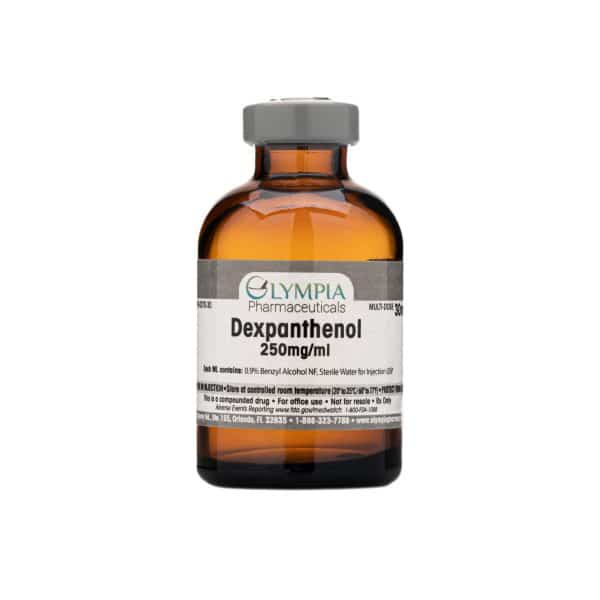Overview of Dexpanthenol (Vitamin B5)
Dexpanthenol, also known as Vitamin B5, is a derivative of pantothenic acid, a water-soluble vitamin that belongs to the B group of vitamins. It is often found in both plant and animal sources, including meat, vegetables, cereal grains, legumes, eggs, and milk. It plays a critical role in the metabolism of carbohydrates, proteins, and fats for energy production and in the synthesis of coenzyme A, a crucial molecule for numerous biological reactions in the body. As the body cannot produce or store vitamin B5, it needs to be a regular part of a healthy diet.
What Is Dexpanthenol Prescribed For?
Post-operative intestinal paralysis, also known as postoperative ileus, is a common complication following abdominal surgery. It is a temporary condition characterized by the cessation of normal bowel motility, leading to symptoms such as abdominal discomfort, nausea, vomiting, and inability to pass stool or gas. It often resolves spontaneously but can sometimes prolong hospital stays and increase patient discomfort.
Dexpanthenol is sometimes used in clinical practice to address this issue. As a derivative of Vitamin B5, it plays a vital role in the energy metabolism of cells, which may be beneficial for stimulating intestinal motility.
Dexpanthenol may be administered orally or by injection to support the recovery of normal bowel function after surgery. Its use has been linked to a decrease in the duration of postoperative ileus, potentially helping patients recover bowel function more quickly, enhancing comfort, and reducing the length of hospital stays.
Additionally, intravenous or intramuscular dexpanthenol is often prescribed or recommended for treating dietary deficiencies of vitamin B5, especially in cases where a healthy diet alone is insufficient to provide the required amount. Pantothenic acid deficiency, though rare, can lead to symptoms such as fatigue, insomnia, depression, irritability, vomiting, stomach pains, burning feet and upper respiratory infections.
Benefits of Dexpanthenol Injections
The benefits of dexpanthenol are vast, mainly due to its role in the formation of coenzyme A. It assists in the breakdown of fats, proteins and carbohydrates from the food we eat into energy, promoting healthy skin, hair, eyes and liver. In terms of respiratory health, dexpanthenol can alleviate symptoms related to asthma and allergies thanks to its anti-inflammatory effects. Dexpanthenol also helps in the healing process of skin wounds and improves the structure and function of the skin. It’s often used in wound healing in post-operative care and can support the body’s immune system function, helping to fight off infections.
Dosage, Concentration, Route of Administration
Dosage: Seek advice from a licensed physician, medical director, or other healthcare provider
Concentration: 250mg/ml
Route of Administration: IV/IM
Precautions/Side Effects
There are no known contraindications for dexpanthenol. Precaution should be taken by individuals who are pregnant or breastfeeding, as it is unknown whether this drug may cause fetal or infant harm. Please consult with your doctor prior to use. There are multiple medications that can interact with dexpanthenol. Make sure to bring a current list of medications and supplements when talking to your healthcare provider so they can review and avoid any possible interactions.
Even though rare, some patients may have allergic reactions to dexpanthenol. Potential signs of an allergic reaction may include:
- – Rash and/or hives
- – Itching, red, swollen, blistered or peeling skin (with or without a fever)
- – Wheezing and tightness in the chest or throat
- – Trouble breathing, swallowing and talking
- – Swelling of the mouth, face, lips, tongue or throat
Stop using Dexpanthenol and call your doctor right away if any of the following bother you or do not disappear:
- – Upset stomach
- – Vomiting
- – Diarrhea
- – Trouble breathing
Storage
Store at controlled room temperature. Protect from light.
Want to Learn More About Dexpanthenol or Schedule a Consultation?


